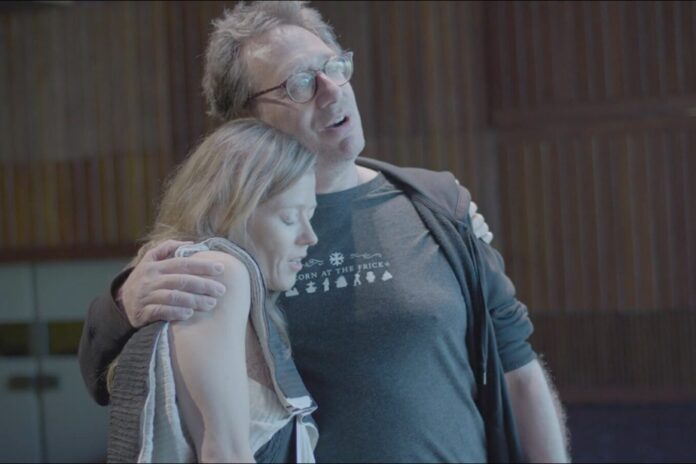French actor and director Mathieu Amalric dives back into the eclectic world of musician and composer John Zorn. With Zorn III (2018-2022), his third film about the New York creator, he explores the relationship between Zorn and a performer, his partner Barbara Hannigan, who has to put a particularly complex score into her mouth.
Mathieu Amalric is fascinated by the work of singers and musicians in general, whom he does not hesitate to call “creative geniuses”, and by the work of New York avant-garde composer John Zorn in particular, who has touched all genres – from punk music to free jazz via klezmer, classical or experimental music.
For this third film devoted to Zorn – presented on Saturday as part of the International Festival of Films on Art (FIFA) – he wanted to dwell on a “detail”, he confides to us during an interview. by videoconference. That of a performer who receives a score and says to himself, reading the first lines: “What the fuck?” “, he illustrates.
Coincidentally, John Zorn wrote a play, Jumalattaret, inspired by pagan Finnish goddesses, and offered it to his partner (since 2015), Barbara Hannigan, a Canadian soprano. The two artists knew each other, but had never worked together.
For his part, Mathieu Amalric, who had met John Zorn in 2008 – he interpreted on stage one of the voices of the musical adaptation of the Song of Songs – was invited to film several projects of the American composer.
The collaboration between Zorn and Hannigan appeared to him to be a promising vein for this third opus.
“There is this correspondence between the two which is very beautiful and frank, underlines Mathieu Amalric. Barbara feels unable to carry out the project, John answers her: “it will be for a next time then…” Then she says to him: “wait!” She needs to change her work habits. Will she make it? It all starts from there. »
This tension is palpable in Mathieu Amalric’s film, which moves from Barbara Hannigan’s rehearsals with pianist Stephen Gosling, to John Zorn’s work sessions, to Zorn and Hannigan’s meeting in Lisbon to discuss details – and pitfalls. – of the piece Jumalattaret, which will ultimately be presented in Hamburg.
There are a bit technical passages – we add a note here, we increase the tempo there or we lower this staff by an octave -, which does not prevent us from appreciating the creative work of these artists, who know how to adjust to the second.
“We must not forget that these films are screened as part of John Zorn’s musical marathons,” insists Mathieu Amalric. They are shown to the public who come to see his shows, so it is sure that it is very precise, but I think that we can still find inspiring these intimate working moments between musicians. »
We submit to Mathieu Amalric that it is also an act of love, since he is filming his lover – he had filmed her in Music Is Music in 2017.
Mathieu Amalric, who will not be able to present his film in Montreal at FIFA in person, is currently working on the shooting of another documentary on the American quartet Emerson, who will give their last concert in Paris on October 7, before bidding farewell to New York in November.
He pursues his film projects – as a director – inspired by the approach of musicians. “It’s that they go to staggering danger zones, so I draw inspiration from the rigor of the music in my cinema. In the sense that there is a lot of preparation work, but at the time of the performance, there is a kind of letting go, animality and pure presence. »
He would like to direct an adaptation of The Man Without Qualities (by Robert Musil), “an unfinished novel of over 2500 pages!” he laughs, but doesn’t turn his back on the game – when he’s given presents. Like this role in Nanni Moretti’s next film (Il sol dell’avvenire) shot last summer.
But, he assures us, there will be a Zorn IV. Because his collaboration – and his friendship – with the American composer will not stop there. We already know that John Zorn will be touring Europe to celebrate his 70th birthday, you can be sure that Mathieu Amalric won’t be far behind with his camera.








